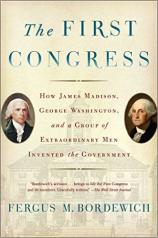The First Congress: How James Madison, George Washington, and a Group of Extraordinary Men Invented the Government
Review
The First Congress: How James Madison, George Washington, and a Group of Extraordinary Men Invented the Government
One of the early thoughts that comes to mind when reading this fascinating history is: How did the likes of James Madison and George Washington ever manage the daunting task of creating the Constitution and, by extension, the federal government? As Fergus Bordewich explains, the road to what Americans have lived and died for for more than 200 years was fraught with pot holes, arguments and frustration. Much of this is understandable: There was no blueprint, no history to look to when deciding what to include or omit from this seminal document.
If you think things are bad now, with all the guidelines in place, imagine what it was like just after America’s liberation from England. Factionalism was a key component of the animas between the states. Those in the Eastern portion of the country had different concerns than those in the South when it came to commerce, and all wanted their interests seen to, with few looking at the bigger picture. Many of the founding fathers (no mothers involved) were confused as to exactly what their jobs entailed. Some couldn’t be bothered to give it more than nodding attention, while others fervently railed in support of their beliefs for what the United States should be.
"[T]he author liberally peppers the narrative with tales of everyday life in the infant United States in the late 18th century... It’s insights like this that keep the book from being too dry."
Today’s politicians battle over the intent of the authors of the Constitution. Just as following those who would live with strict adherence to the Bible, the march of time has presented ideas that never could have been conceived in days of old. Some would be gratified to know that “Madison never expected the Constitution to be cast as if it were a bronze idol, a sort of American baal, immutable for all time.”
Bordewich writes, “The First Congress was characterized by the collision of opposing interests, ideological dogmatism, preening egos, personal and sectional distrust, self-dealing, and the dragging inertia of time-serving mediocrity.” Remove the word “first,” and it’s amazing how little has changed in the marble halls of Washington and the more humble structures within each congressional district. Politicians are still accused of pandering and putting self-interest above their constituents.
There is a fair amount of thematic repetition in THE FIRST CONGRESS; incessant arguing will do that. Fortunately, the author liberally peppers the narrative with tales of everyday life in the infant United States in the late 18th century, and how things we take so for granted, such as crossing the Hudson River, were frequently life-or-death events. It’s insights like this that keep the book from being too dry.
Reviewed by Ron Kaplan on February 19, 2016
The First Congress: How James Madison, George Washington, and a Group of Extraordinary Men Invented the Government
- Publication Date: February 21, 2017
- Genres: History, Nonfiction, Politics
- Paperback: 416 pages
- Publisher: Simon & Schuster
- ISBN-10: 1451692110
- ISBN-13: 9781451692112





